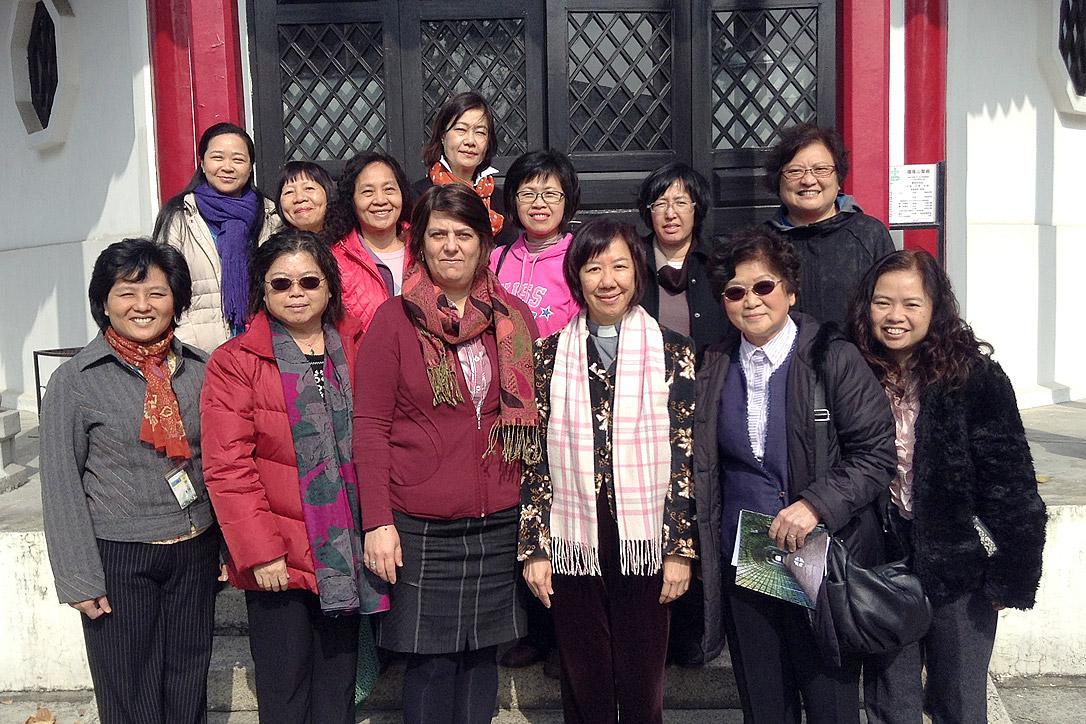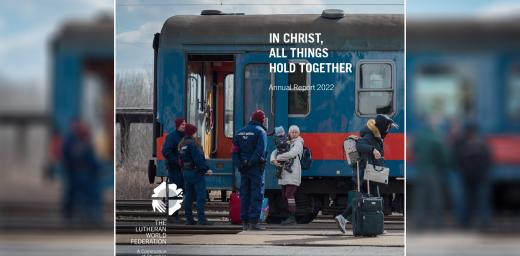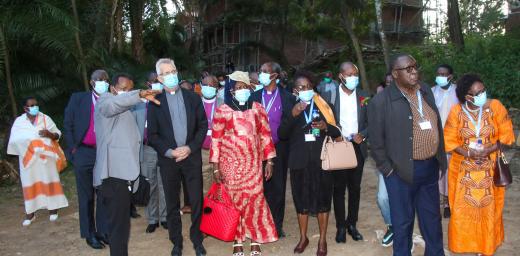Women in Ordained Ministry Reflect God’s Call

The North East Asian Lutheran Communion women theologians together with the LWF Secretary for Women in Church and Society. Photo: LWF
Interview with LWF General Secretary on International Women’s Day
6 March 2014 (LWI) – The International Women’s Day is observed on 8 March. This year the theme is Equality for Women Is Progress for All. According to the UN, International Women’s Day is a time to reflect on progress made and to call for change. Lutheran World Information (LWI) asked General Secretary Rev. Martin Junge how The Lutheran World Federation (LWF) is actively engaged in the issue.
How does the International Women’s Day theme Equality for Women is Progress for All speak to you as the General Secretary of The Lutheran World Federation?
The theme captures in a very poignant way that so-called “women issues” are not issues that affect women only, but are issues that relate to the whole society in which they live, or in the case of the church, about the whole church. Equality of women speaks about the quality of relationships, and about the values that inform these relationships. For a church to be engaged in processes that work towards equality of women is not, therefore, a token, or an altruistic gesture towards those considered weak. Rather, such a process is the joint effort of men and women to make the church a better place, thereby becoming a powerful sign of our reconciliation and unity in Christ through baptism across the divides of ethnicity, social status and gender.
How has the LWF helped inspire equality for women and how does it see its future engagement doing so?
For the LWF the commitment to equality is given concrete expression through a number of governance decisions and programmatic activities. The LWF has a long history of project support to member churches that are committed to promoting the equality of women in church and society. In 1984, the LWF adopted at its Assembly the policy that at least 40 percent of women and 40 percent of men should be represented in its bodies, and therefore also in its governance.
The same principle is applied when it comes to LWF’s activities and programs. This includes scholarship support, both for theological studies and for studies related to development. Since 1984 the LWF has recognized and affirmed the goal of seeing women in the ordained ministry. This has been reflected in all LWF Assemblies held during those three decades. The LWF campaign “Churches say ‘NO’ to Violence against Women”, implemented during the first decade of the 21st century, had a tremendous impact. Our engagement in the field of humanitarian response and development work (Department for World Service) includes gender justice as a cross-cutting objective. The LWF Strategy “With Passion for the Church and for the World” includes gender justice as a cross-cutting issue. In 2011 the LWF Communion Office was certified for gender-equal salaries. Last year the 2013 LWF Council adopted a gender justice policy implementing a decision of its Assembly in 2010.
There is a solid and consistent journey behind us, yet there is a lot of new ground to break in the future.
In 2013 the LWF published a gender justice policy. What is the positive change the LWF hopes to see coming out of this new policy?
Through our journey we have learned to recognize that securing women’s participation through quotas does not automatically imply that women are participating under equal conditions.
This is the background for the call for a gender justice policy at the Assembly in Stuttgart.
The LWF Gender Justice Policy is meant to support and enhance the communion’s journey towards inclusiveness. Based on biblical and theological understanding, and drawing from Lutheran theological identity, it provides guidance and methodologies for contextualized action plans at a regional and local level of the communion.
The LWF will follow up on these discussions. The positive change expected is to see the commitment for justice in relationships among genders as a matter of faith, and to produce more just relationships.
Seventy-seven percent of LWF member churches ordain women. Why is the question of ordination important for the LWF?
The statistics you mention go back to the year 2012. Meanwhile, more member churches are communicating their intention to ordain women or that they have already done so.
As Lutherans we believe that God has made us part of a new community through baptism and has called the whole people of God—men and women—to participate in God’s mission. It is out of this understanding that we define the ministry of the church, which is open and reflective of this new community in Christ.
That is the reason why, in the LWF, we do not speak about the “ordination of women” but about “women in the ordained ministry of the church,” a phrase which conveys our conviction of the importance of the inclusive character of the ministry.
In other words, the importance of this issue stems from the fact that the participation of women in the ordained ministry is ultimately about our understanding of the ministry of the church. And it is about how this ministry reflects God’s call to the whole people of God, thus becoming a witness of God’s new creation in baptism, through which we are made a new community (Galatians 3).
The LWF is a communion with member churches in different cultures. Is the question of women in the ordained ministry of the church a question of different cultures?
The LWF is committed to an understanding of the ordained ministry as an office that is inclusive for both men and women. This is a goal that has been affirmed by LWF Assemblies since 1984 and has been owned by 77 percent of member churches, which includes 93 percent of the membership of the LWF.
As we accompany each other in pursuit of this goal, we hear and know that some churches need to move slower because of issues of biblical hermeneutics, cultural and ecumenical/interfaith relations.
Coming back to your question, there is a need to look carefully yet also critically at cultural realities, particularly in view of the fact that the Gospel of Jesus Christ is in so many respects counter-cultural. For example, I do not think it is part of many cultures today to love one’s enemy, yet we seek to announce this in words and deeds; I do not think it is part of many cultures today that one’s God-given freedom will make us a servant to the needs of our neighbor, yet we seek to announce this in words and deeds; neither is it part of many cultures today that one will receive gifts for free, yet this constitutes the core of the Gospel of Jesus Christ as proclaimed not only by Lutheran churches.
The Apostle Paul encourages the people of God to not be ashamed of the Gospel of Jesus Christ, but to continue preaching and living it in our given cultures. Every church is called on a daily basis to discern how it wants to witness in its specific context, thereby also in its culture. At the same time it will seek to be faithful to God’s mission, which in its substance carries so many counter-cultural elements.
The argument of culture is therefore a very relative one.
The LWF is engaging in ecumenical dialogue with partners who have different standpoints on the issue of women in the ordained ministry and women’s engagement. Does this present a problem to the dialogues?
The LWF continues to be engaged in rich and meaningful ecumenical relations and dialogues. The Joint Declaration on the Doctrine of Justification was signed in 1999, therefore 15 years after the LWF Assembly in 1984 that recognized and affirmed the goal of women in the ordained ministry. For some decades already the LWF has been represented by ordained women in our different ecumenical dialogues, including dialogues with churches that do not ordain women. And these dialogues continue producing good fruits. In the LWF audiences with Pope Benedict XVI and Pope Francis, the LWF delegations have included ordained women, some of them holding the episcopal office. We come to these interactions as the communion that we are, and I am grateful to be able to say I never felt that our interactions were at any point problematic because of the composition of LWF’s delegation, or that a difference was made between members of the delegation. This is what adds value to our ecumenical dialogues and relations —the fact that they are based on honesty and transparency about who we are.
What is your vision for the positive change for women in the LWF you want to share on International Women’s Day?
I hope and pray that violence against women—still a reality for many—is going to stop.
I hope and pray that we move from securing quotas for women’s participation to securing conditions for women’s participation.
And I hope and pray that more churches will own the commitment to women in the ordained ministry as we engage in open and respectful conversations that are faithful to the Word of God that invites the baptized to become a prophetic sign of God’s powerful reconciliation.





